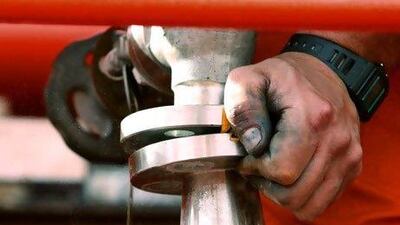The UK government's raising of taxes on North Sea oil production helped to cut Taqa's first-quarter profit almost in half.
Comment: In oil and gas, risks at every turn
Tamsin Carlisle // Sharply divergent profit paths for Taqa and the Austrian petroleum group OMV show that oil and gas producers face political risks in developed countries that can be at least as high as in emerging economies.
OMV, which is 20 per cent owned by Abu Dhabi’s International Petroleum Investment Company, yesterday posted a 5 per cent increase in first-quarter profit to €365 million (Dh1.93 billion), despite the loss of most of its Libyan oil output.
Taqa, which said its operations in the Middle East and North Africa were virtually unaffected by unrest, suffered a net fall in profit of 47 per cent because of an unexpected increase in UK taxes on oil and gas production.
“The first quarter of 2011 proved to be a very difficult one, where a strong operating performance was overshadowed by political turmoil in North Africa and the Middle East,” said Gerhard Roiss, the OMV chief executive.
The markets will judge which company performed better last quarter and which had the greater risk exposure.
First-quarter profit for the oil, gas and power group controlled by the Government of Abu Dhabi fell to Dh152 million (US$41.3m) for the first three months of this year. That was 47 per cent lower than in the first quarter of last year. Revenue rose 15 per cent to Dh5.5 billion.
Yesterday, shares of Taqa, also known as Abu Dhabi National Energy Company, fell 1.43 per cent to Dh1.38 - their eighth consecutive trading decline. The stock has lost 6.7 per cent so far this year.
In mid-March, the UK government increased taxes on North Sea oil and gas operations by 12 per cent, backdated to January 1.
"This contributed to a 53 per cent year-on-year increase in tax, negatively affecting net profit," Taqa said.
The tax change reduced the company's earnings for the quarter by Dh150m, Doug Fraser, the chief financial officer, estimated. "It will continue to impact our results."
Under the new tax regime, Taqa pays more than 70 per cent of its pre-tax income from UK North Sea oil and gas production to Westminster.
"We didn't see this coming," Mr Fraser said. "We were aware of the fact that the UK government was a bit stressed [and] so would be looking for ways to raise revenue, but we were certainly surprised."
For the moment, Taqa remains committed to its previously budgeted $500m investment programme in the UK North Sea this year, but the plan could be reviewed.
"We're a global business with a capital budget of $2bn this year, all from internally generated cash flow," Mr Fraser said. "We can discuss where to deploy our capital. It's safe to say that the UK government has made the investment environment less attractive. Regarding our ongoing spending, we will evaluate this business compared to the attractiveness of other areas."
Taqa was participating in UK oil industry lobbying efforts to persuade the government to reverse the tax increase.
In their latest monthly oil market report, released yesterday, Opec analysts predicted that UK oil supply would decline by 60,000 barrels per day (bpd) this year to an average of 1.41 million bpd. That was a 10,000 bpd downward revision from their forecast last month, reflecting a 25 per cent drop in first-quarter drilling activity.
"The increased tax on producers has pushed some firms to delay their investment in the UK," Opec said.
Taqa's first-quarter profit before tax rose 11 per cent to Dh961m, despite foreign exchange losses.
The company attributed the rise to increased oil and gas output and higher power and water revenues after the start-up of the Fujairah-2 electricity and desalination plant in the UAE. The integrated power and water development, the second largest of its kind in the world, was inaugurated on Tuesday after a three-month commissioning period.

